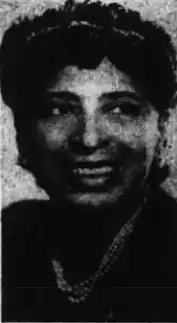Artie Belle McGinty
Artie Belle McGinty (1892–1963)[1] was an American actor in theater, films, and radio in the United States from the 1910s through the 1940s. She performed as a singer, dancer,[2] and comedienne.[3] She was a member of the Negro Actors Guild[4] and an appointed member of the organization's dance committee.[5]
Artie Belle McGinty | |
|---|---|
 | |
| Born | 1892 Atlanta, Georgia, U.S. |
| Died | 1963 (aged 70–71) |
| Occupation(s) | Actress, performer, comedienne |
| Years active | 1914–1948 |
Early life
McGinty was born in Atlanta, Georgia, to a shoemaker father and music teacher mother.[6] Her focus as a child was on music, writing, and the dramatic arts. Her father tried to push her into becoming a teacher like her mother, but McGinty wanted to become a theater actor, and her mother supported her in these endeavors. When she was seven, she had her stage debut at a poetry recital. She played piano at 12 for other singers. She also worked as a seamstress at a tailor shop to earn money for her other activities.[7]
Career
Radio
Her debut on the radio occurred in 1927 as the original radio ad voice for Aunt Jemima.[7] During the 1930s, she co-starred on the radio show Old Gold Hour alongside Fred Waring.[8] On the show, she used the name Mandy Lou and played the role of the "stooge" who asked set-up questions for their comedic partner.[6] She was replaced on the Old Gold Hour by Rosemary and Priscilla Lane by 1935 and, due to her role in Loose Moments lasting only a week, had to work as a cook due to a lack of other opportunities.[9] In the early 1940s, she starred in the radio show soap opera Amanda of Honeymoon Hill on the station WABC.[10] McGinty also starred in The Goldbergs during the same time period.[11]
Film and theatre
During her 20s, McGinty was part of C. W. Park's Musical Comedy Company from August to November 1914. The following year, she joined Alexander Tolliver's Circus and Musical Extravaganza and performed in his Big Show and Smart Set series from March 1915 until September 1917. She acted in a combination role with fellow vaudeville performer Tressie Leggs.[2][12] She also toured and performed with Ma Rainey.[13]
Theater
- Lily White (1930) as Sister Dolsey[14]
- Loose Moments (1935) as Lilla[15]
- Plumes in the Dust (1936) as Lizzie[16]
- You Can't Take It With You (1939)[17]
- No Time For Comedy (1940)[18]
- Janie (1942)[19] as Tina[20]
Filmography
- Chicago After Dark (1946 short)[21][22]
- Lucky Gamblers (1946 short)[23]
- Junction 88 (1947) as Mrs. Jenkins[24]
References
- "Junction 88". National Museum of African American History and Culture. Smithsonian. 2022. Retrieved June 26, 2022.
- Abbott, Lynn; Seroff, Doug (September 17, 2009). Ragged but Right: Black Traveling Shows, "Coon Songs," and the Dark Pathway to Blues and Jazz. University Press of Mississippi. pp. 122, 129, 139, 143, 149, 357–358. ISBN 9781604731484.
- Orgill, Roxane (2001). Shout, Sister, Shout!: Ten Girl Singers who Shaped a Century. Simon and Schuster. p. 19. ISBN 9780689819919.
- "Negro Actors Guild In Dire Need Of Funds". The Illinois Times. 1 (7): 2. March 31, 1950. Retrieved June 26, 2022.
- "Guild Plans Spring Roundup". The New York Age. March 21, 1953. Retrieved July 1, 2022 – via Newspapers.com.
- Eckstein, Aileen (June 3, 1933). "Wave Lengths". The Pittsburgh Courier. Retrieved July 1, 2022 – via Newspapers.com.
- "Mandy Lou Takes Spot From Stars". The Pittsburgh Press. May 14, 1933. Retrieved July 1, 2022 – via Newspapers.com.
- "Artie Belle McGinty On Summer Visit To South". The New York Age. July 6, 1935. Retrieved June 26, 2022.
- Reston, James B. (February 25, 1935). "Seen by a New Yorker at Large". Democrat and Chronicle. Retrieved July 1, 2022 – via Newspapers.com.
- Calvin, Dolores (November 7, 1942). "Radio Fascinates Me, Says Artie McGinty". Jackson Advocate. Retrieved July 2, 2022 – via Newspapers.com.
- "Radio Artist – Artie Bell McGinty". The Pittsburgh Courier. July 3, 1948. Retrieved July 2, 2022 – via Newspapers.com.
- Sampson, Henry T. (October 30, 2013). Blacks in Blackface: A Sourcebook on Early Black Musical Shows. Scarecrow Press. p. 1230. ISBN 9780810883512.
- Chilton, John (1997). Let the Good Times Roll: The Story of Louis Jordan and His Music. University of Michigan Press. pp. 12–13. ISBN 9780472084784.
- C. F. F. (May 13, 1930). "Helen Menken Stars In Another Dramatic Story of Negro Race". Brooklyn Times-Union. Retrieved July 1, 2022 – via Newspapers.com.
- "On The Boston Stage: "Loose Moments"". The Boston Globe. January 29, 1935. Retrieved June 26, 2022.
- Mantle, Burns (November 7, 1936). "'Plumes in the Dust' in 46th Street". New York Daily News. Retrieved July 1, 2022 – via Newspapers.com.
- "Summer Stage Ogunquit Playhouse: 'You Can't Take It With You'". The Boston Globe. June 27, 1939. Retrieved July 1, 2022 – via Newspapers.com.
- "Frances Starr At Ogunquit". The Portsmouth Herald. July 27, 1940. Retrieved July 1, 2022 – via Newspapers.com.
- "Amusements: Janie". Hanover Evening Sun. April 29, 1944. Retrieved July 1, 2022 – via Newspapers.com.
- R. J. (April 8, 1944). "Brock Pemberton's 'Janie' Proves Hilarious Comedy". The Morning News. Retrieved July 1, 2022 – via Newspapers.com.
- Richards, Larry (September 17, 2015). African American Films Through 1959: A Comprehensive, Illustrated Filmography. McFarland & Company. p. 36. ISBN 9781476610528.
- Webb, Graham (2020). Encyclopedia of American Short Films, 1926-1959. McFarland & Company. p. 106. ISBN 9781476639260.
- "Lucky Gamblers (1946) [Lost Film]". Department of Afro American Research Arts & Culture. August 29, 2018. Retrieved July 2, 2022.
- America Film Institute (1997). Within Our Gates: Ethnicity in American Feature Films, 1911–1960. University of California Press. p. 540. ISBN 9780520209640.